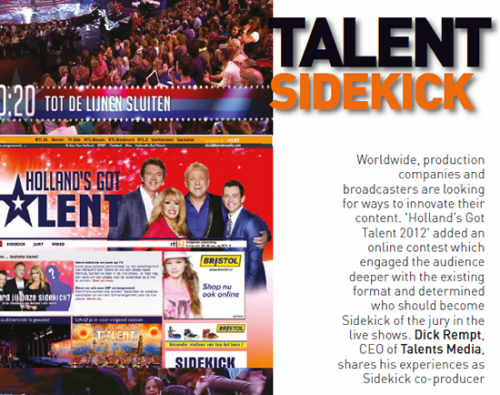Talent Sidekick: Dick Rempt on Online Social Talent Acquisition Platform

This article was originally publishing in the Association of International Broadcasting (AIB) magazine, The Channel which can be found online here.
Over 900 million people worldwide are on Facebook – more than half of them check in for at least half an hour – daily. Following the eyeballs, brands are shifting significant parts of their media spend to social media – cutting down their spend on TV content and advertising.
This hurts content companies and broadcasters. Even a one per cent shift in budgets is worth millions worldwide. The past year has therefore shown a frantic search for online/social media tactics around TV content that would funnel brands’ online spend back to broadcasters and content owners.
There’s a lot to defend. Fremantle for example has invested heavily for years in successful brands like XFactor, Idols and Got Talent. Key question: is there a way to innovate these great content brands to stay competitive?

 I was lucky enough to meet Hanna Sköld recently at the 2nd EU Digital Assembly in Brussels in June and share some time with her discussing future disruption in the audiovisual world - both in TV and film... and her story is simply brilliant - a must 'hear' any industry dinosaurs and incumbents who ratchet on about how they hold the reins on TV and film financing and, it takes deep pockets and a strong traditional network to make a successful audiovisual product. Several industry pundits were skeptical of crowdfunding and crowdsourcing in general at the event - but in essence - this new movement and phenomenon only helps big players validate what can and will work in the 'big' market.
I was lucky enough to meet Hanna Sköld recently at the 2nd EU Digital Assembly in Brussels in June and share some time with her discussing future disruption in the audiovisual world - both in TV and film... and her story is simply brilliant - a must 'hear' any industry dinosaurs and incumbents who ratchet on about how they hold the reins on TV and film financing and, it takes deep pockets and a strong traditional network to make a successful audiovisual product. Several industry pundits were skeptical of crowdfunding and crowdsourcing in general at the event - but in essence - this new movement and phenomenon only helps big players validate what can and will work in the 'big' market.  What exactly is TV these days? The younger the person is that you ask, the more and more you'll hear an answer that defines television by content that is shown in a series format, not just linear programming through those rigid old pipes. My thirteen year old sister watches more video on her computer than on the television set. That's probably not surprising to many of you, assuming you're following recent statistics. However, what I do find surprising about her consumption habits is that she prefers to watch web series rather than high end studio productions on a daily and weekly basis. On an average school night, she often forgets about the television screen all together!
What exactly is TV these days? The younger the person is that you ask, the more and more you'll hear an answer that defines television by content that is shown in a series format, not just linear programming through those rigid old pipes. My thirteen year old sister watches more video on her computer than on the television set. That's probably not surprising to many of you, assuming you're following recent statistics. However, what I do find surprising about her consumption habits is that she prefers to watch web series rather than high end studio productions on a daily and weekly basis. On an average school night, she often forgets about the television screen all together!